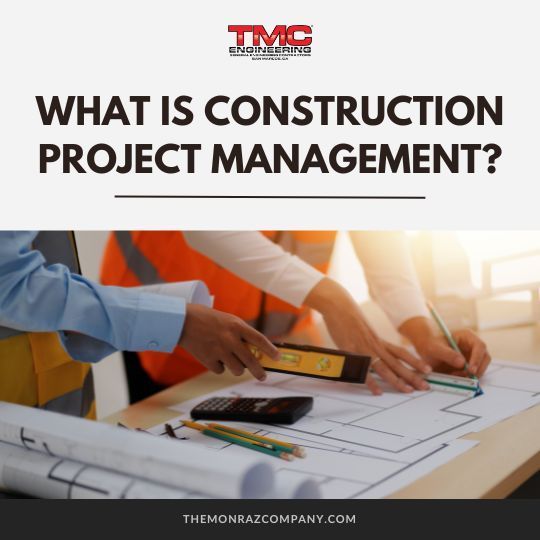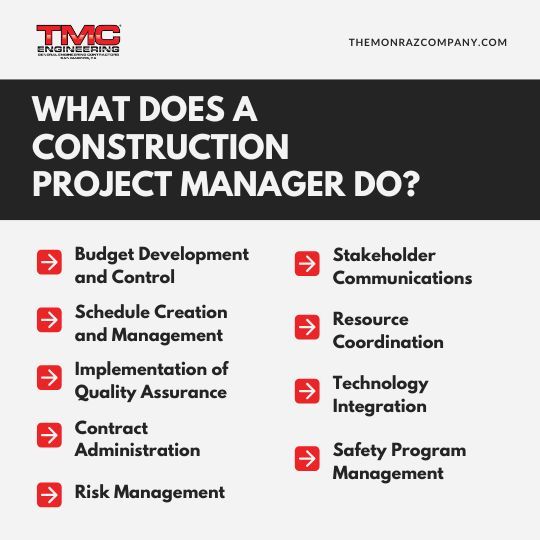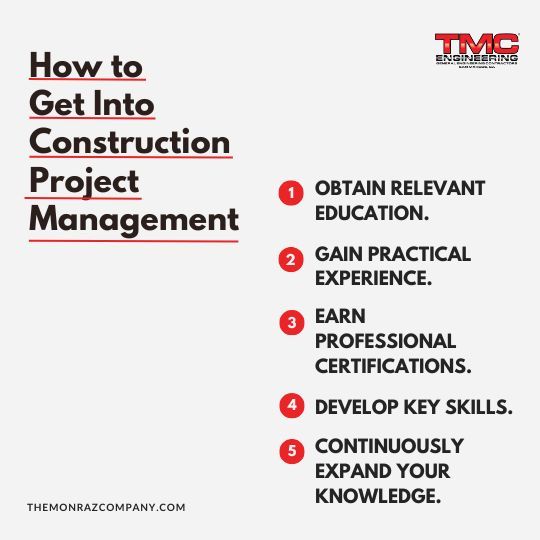What Is Construction Project Management?
Construction projects are intrinsically dynamic, with a myriad of variables on the move, tight timelines, and coordination across many stakeholders. Successful construction project delivery is no accident, but the result of meticulous planning, intelligent execution, and close oversight. That's where the concept of construction project management comes to the fore, pushing the boundaries of the industry and making large-scale building initiatives a reality.
In this comprehensive guide, we'll take a closer look at construction project management, exploring its core principles, the responsibilities of a construction project manager, and the steps you can take to embark on this rewarding career path.
If you have repair and construction questions needing expert answers, call the experts at
TMC Engineering
! If you're in Southern California, we can instruct you on your problem and perform whatever repair is necessary. We've got an expert solution for all your asphalt or concrete needs!

What Is Construction Project Management?
Construction project management is the systematic way of planning, scheduling, and controlling the various phases of a construction project from the initial stages to its delivery. It involves a wide list of activities that range from scheduling and cost estimation to resource management, risk handling, and quality control, all aimed at achieving the ultimate goal of delivering a successful project that fulfills or surpasses the expectations of the client.
Construction project management integrates alternative approaches to established project delivery methods. This ranges from traditional design-bid-build to design-build and construction management at risk, depending on specific project requirements. Such approaches establish frameworks that detail responsibility, procedures, and risk-sharing among the stakeholders in a project. The construction industry heavily relies on systematic approaches to managing complex projects with numerous stakeholders and variables.
Effective managers must balance competing demands such as:
- Meeting established timeframes
- Staying within budgetary constraints
- Achieving quality standards
- Ensuring regulatory compliance
- Managing stakeholder relationships
- Mitigating risks throughout the project lifecycle
This balancing act requires both technical expertise and leadership skills to deliver successful outcomes amid construction complexity.

What Does A Construction Project Manager Do?
Budget Development and Control
Construction project managers develop accurate cost estimates and exert strict control over budgets when delivering projects. This critical role involves analyzing financial data, estimating costs, and identifying probable cost overruns prior to impacting the bottom line.
Effective budget management includes:
- Creating comprehensive initial estimates based on project scope
- Monitoring actual spending against projections
- Handling change orders and their financial consequences
- Finding cost-saving opportunities without compromising quality
- Implementing value engineering when appropriate
- Providing regular financial updates to stakeholders
The capacity to manage financial resources effectively has a direct bearing on project profitability and customer satisfaction. Managers need to comprehend high-level financial considerations and detailed cost factors.
Schedule Creation and Management
Creating realistic project schedules with all construction activities is a central function of the construction project managers. Using work breakdown structures, managers establish dependencies, define milestones, and allocate resources effectively.
Schedule management encompasses:
- Developing detailed timelines with appropriate contingencies
- Identifying critical path activities that directly impact completion dates
- Monitoring progress against established milestones
- Adjusting schedules proactively when deviations occur
- Communicating timeline updates to all stakeholders
- Coordinating multiple trades and activities on the job site
The project schedule serves as both a roadmap and accountability tool, helping contractors coordinate efficiently while providing clients with reliable completion expectations.
Implementation of Quality Assurance
Construction project managers establish quality standards at the start of project implementation. This involves designing quality control measures, conducting routine inspections, and ensuring adherence to specifications and building codes.
Quality management activities encompass:
- Creating complete quality management plans
- Establishing inspection procedures and checkpoints
- Coordination of inspectors and regulatory agencies
- Defects in recording quality and corrections
- Correct handling and installation of material
- Pre-installation meetings for setting expectations
By enforcing rigid quality standards, you are protecting both the integrity of the project and the reputation of all who are involved. Quality control isn't a visual issue alone it directly affects building performance, life, and safety.
Contract Administration
Administration of construction contracts requires attention to detail and legal considerations. Project managers see to it that all contractual requirements are fulfilled by the parties and that documentation is properly maintained throughout the project.
Contract administration entails:
- Detailed review and understanding of contract documents
- Processing change orders and amendments
- Tracking contractual milestones and deliverables
- Documentation of all decisions and changes
- Resolving disputes regarding contract interpretation
- Coordination with counsel when necessary
Effective contract administration protects everyone and provides clarity regarding expectations and responsibilities in the process of project delivery.
Risk Management
Risk identification, analysis, and mitigation are important aspects of construction project management. Construction professionals acknowledge that early risk management prevents costly delays and disputes.
Risk management methods involve:
- Conducting thorough pre-construction risk analysis
- Developing contingency plans for identified risks
- Implementing safety measures to prevent accidents
- Addressing insurance requirements and documentation
- Developing procedures for dispute resolution
- Monitoring risk factors during project execution
Your ability to anticipate potential problems before they arise helps to safeguard the project schedule and protect the interests of all the parties involved in the construction project.
Stakeholder Communications
Project managers in construction ensure that there is proper communication between all the stakeholders in the project, including owners, architects, engineers, general contractors, subcontractors, and regulatory agencies.
Communication tasks involve:
- Conducting and organizing project meetings
- Taking and sharing meeting minutes
- Preparing reporting mechanisms for project status updates
- Managing document control and information sharing
- Avoiding conflicts and miscommunication
- Maintaining open lines of communication to all stakeholders
Effective communication prevents misalignments that can lead to mistakes, rework, and site delays. As the conduit for communication, your ability to convey information effectively and establish expectations directly impacts project harmony from start to finish
Resource Coordination
Project construction managers optimize labor, material, and equipment allocation and use throughout the project. It involves logistics coordination, managing delivery schedules, and improving the performance of workforces.
Resource coordination involves:
- Requirements forecasting based on project schedule
- Managing delivery and procurement times
- Coordinating equipment utilization and maintenance
- Allocating experienced workers suitably
- Resolving several constraints simultaneously
- Preventing supply constraints within the chain
Efficient handling of resources impacts project schedules and budget and eliminates downtime and project implementation delays.
Technology Integration
Construction management in the contemporary era relies increasingly on technology tools to maximize efficiency and project control. Project managers study, embrace, and track various technologies during the course of a project.
Technology responsibilities include:
- Utilizing Building Information Modeling for sophisticated coordination
- Applying project management software to schedule and track progress
- Utilizing mobile solutions to document in the field
- Implementing electronic documentation systems
- Analyzing project data to improve decision-making
As professionals in construction increasingly embrace digital transformation, your technological fluency provides a competitive advantage in delivering successful projects.
Safety Program Management
Workplace safety is both an ethical and lawful responsibility of construction project managers. Creating and implementing comprehensive safety programs protects workers, prevents accidents, and helps avoid delays that could hinder completing the project.
Safety responsibilities include:
- Development of construction site-specific safety plans
- Conducting regular safety training and toolbox talks
- Ensuring OSHA and other regulatory compliance
- Conducting job hazard analyses of high-risk tasks
- Investigating accidents and taking preventive actions
- Creating a safety-first culture among all site staff
Your dedication to safety has a direct effect on worker health, insurance premiums, productivity, and project success.

How to Get Into Construction Project Management
Embarking on a career in construction project management requires a combination of education, experience, and specialized skills. Here are the typical steps you can take to become a successful construction project manager:
Step 1: Obtain relevant education.
Most construction project management positions require a bachelor's degree in construction management, civil engineering, or a related field. These programs provide a solid foundation in construction processes, project management principles, and technical skills necessary for the job.
Step 2: Gain practical experience.
While formal education is essential, practical experience is equally crucial in the construction industry. Consider internships, entry-level positions, or apprenticeships that allow you to develop hands-on experience in construction operations, scheduling, and problem-solving.
Step 3: Earn professional certifications.
Obtaining professional certifications, such as the Project Management Professional (PMP) or the Construction Management Association of America (CMAA) certification, can significantly enhance your credibility and demonstrate your expertise in the field of construction project management.
Step 4: Develop key skills.
Successful construction project managers possess a diverse set of skills, including strong communication, problem-solving, decision-making, and leadership abilities. Additionally, employers highly value professionals who are proficient in project management software, cost estimation, and contract administration.
Step 5: Continuously expand your knowledge.
The construction industry is constantly evolving, with new technologies, regulations, and best practices emerging regularly. Successful construction project managers must commit to ongoing learning and professional development to stay ahead of the curve and deliver the best possible outcomes for their projects.
Remember, the path to becoming a construction project manager may vary depending on your educational background, previous experience, and the specific requirements of the construction industry in your region. By following these general steps and leveraging the opportunities available, you can position yourself for a rewarding and fulfilling career in this dynamic field.
Construction project management is a vital component of the construction industry.
Construction project management is responsible for orchestrating the complex mix of materials, people, and processes that shape vision into reality in large building projects. Through proper blending of construction project planning, risk management, and stakeholder coordination, construction project managers exert a profound impact on the built world and the advancement of the industry.
Whether you are a seasoned construction professional or an aspiring beginner in the field, understanding the basic functions of construction project management can lead to new possibilities. Take up the challenge, grow your expertise, and become the driving force behind innovative construction projects that leave a lasting impact on our world.
At
TMC Engineering, we have a deep commitment to delivering projects characterized by the highest
standards for safety, workmanship, and client satisfaction. We aim to provide you with valuable content and insights related to the
services our
team of experts provides!
Whether you require asphalt paving, striping, sealing, or concrete work, we offer a full suite of transportation construction solutions. Look no further—we’ve got all you need and more!




